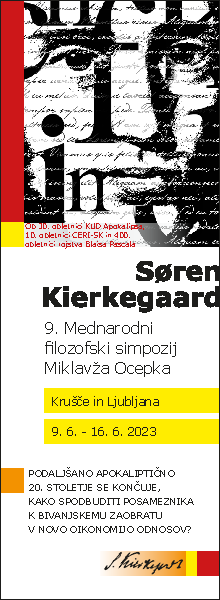International Scientific Research Project (Sept. 2015 - Sept. 2016)
Participating Institutions:
Constantine the Philosopher University, Nitra, Slovakia (Department of General and Applied Ethics)
Kierkegaard Circle, Trinity College, University of Toronto, Canada
Goethe University Frankfurt, Germany (Institute for Systematic Theology and Philos-ophy of Religion)
Central Research Institute Søren Kierkegaard, Ljubljana, Slovenia
Participants:
Abrahim Khan (Canada)
Andrew Burgess (USA)
Jamie Turnbull (GB)
Simon Podmore (GB)
William David McDonald (Australia)
Ingrid Basso (Italy)
Gerhard Schreiber (Germany)
Roman Králik (Slovakia)
Martina Pavlíková (Slovakia)
Peter Kondrla (Slovakia)
Jarmila Jurova (Slovakia)
Cyril Diatka (Slovakia)
Primož Repar (Slovenia)
Vladimír Manda (Slovakia)
Ciprián Turčan (Slovakia)
Martin Štúr (Slovakia)
Andrej Gogora (Slovakia)
Miroslav Sapík (Czech Republic)
Klement Mitterpach (Slovakia)
Project Description:
Throughout his life Kierkegaard draws inspiration from classical Greek thinkers. Over and over he refers to Plato, Aristotle, and other Greek philosophers, as well as to Greek rhetoricians, dramatists, poets, and historians. For Kierkegaard “the Greeks” (and, above all, his favorite philosopher, Socrates) represent the ideal of a life com-bining individual reflection with ethical action—an ideal he finds all too often ignored within nineteenth-century Copenhagen. The purpose of the present volume, therefore, is to explore this rich source of Kierkegaard’s thought, in order both to understand his arguments in their historical context and to apply them today.
The focus of this international scientific research project is
(1.) to analyze Kierkegaard’s historical method for analyzing Socrates
(2.) to identify Kierkegaard’s approaches to aesthetics and his literary methods
(3.) to cover the materials in corresponding lectures at the university (Plato, Aristotle, and other Greek philosophers)
The findings of the research will be published in monograph entitled Kierkegaard and Classical Greek Thought in 2016 by the Kierkegaard Circle, Trinity College, University of Toronto, Canada as vol. 7 of the series Acta Kierkegaardiana (ISBN 978-0-9878168-5-6).



